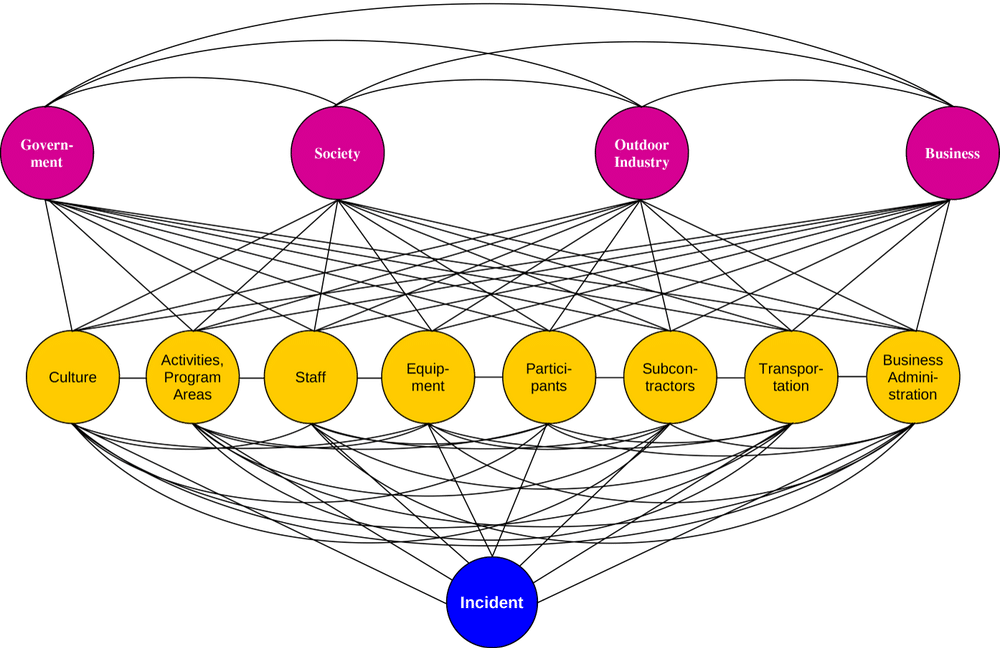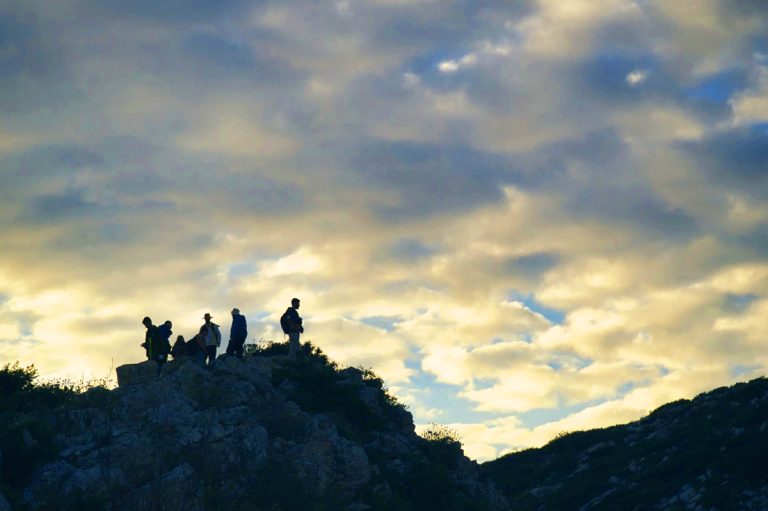How a national election influences risk management of outdoor, experiential, wilderness, and travel programs
Injury, illness, psychological harm, property damage. On outdoor and experiential programs, why do these incidents occur? Systems-informed risk management helps us understand why an incident happens. It’s typically when factors in one or more risk domains come together to lead to an incident.
A model of risk domains—or “risk reservoirs,” where risks reside—that can lead to an incident, looks like this:

Direct risk domains—like with participants, who fail to follow directions, or transportation, with risk of motor vehicle accident—easily come to mind. They’re in yellow in the diagram above. But note the underlying risk factors (in fuchsia) that also influence incident causation. These include the actions and values of governments and societies, two of the four interlinked underlying risk domains. These are important but often underappreciated factors in incident causation.
Today in the USA, a big step forward was made in fostering safety. This includes safety of different types–physical and psychological. And it affects all aspects of society in the USA—not just with outdoor and experiential programs, but of course far beyond. Its impact will be felt in countries in every single corner of the world.
I’ll highlight here three influences where today’s electoral results can influence outdoor safety in the USA: with public health, psychological safety, and responsible regulation.
Public Health
The response of the USA’s federal government to the coronavirus pandemic has led to the preventable loss of hundreds of thousands of lives in that country alone, and the grief and anguish of countless other people. It’s led to the dismembering of schooling for young persons, and immense damage to businesses and institutions of all types. And the negligent response has degraded elements of respectful civil society, a fundament of human civilization, which people have labored for thousands of years to build.

A dramatic shift we can now expect in public health practice in the USA is poised to newly enable those in that country to move towards resuming their normal pre-pandemic lives.
This is something that millions of people in other countries have already accomplished. Iceland, Taiwan, and New Zealand, among others, have within their borders already successfully contained the SARS-CoV-2 pandemic. This was done without vaccines or other expensive pharmaceutical interventions. It was achieved simply by individuals diligently following good public health policy such as mask use, physical distancing, and hygiene, and by government-led efforts in areas such as contact tracing, isolation and quarantine measures.
As the USA brings its public health practice in line with well-established norms, this will also enable those in that country to engage in essential life activities like going to work, or getting an education, without a grossly elevated risk of contracting a deadly viral disease.
It will reduce crippling restrictions on economic activity of all types, including outdoor education, outdoor recreation, adventure experiences and travel-based programs.
And as outdoor and experiential programs resume, participants can enjoy the benefits of those programs free from concerns about the coronavirus and their health.
Psychological Safety
An essential aspect of risk management for outdoor and experiential programs is psychological risk management.
In a society where political leadership models respect and inclusion, and elevates the voices of persons from historically and currently disenfranchised groups such as Black people or women, this helps set the tone for individuals throughout society–including leaders and participants in outdoor and experiential programs–to likewise support equity and inclusion in their words and daily actions.
Responsible Regulation
In outdoor program risk management, wilderness risk management, and safety of travel and experiential programs, it’s easy to think about immediate risks–like the failure of poorly maintained equipment, or insufficient staff training. But an influential set of underlying risk factors that influence on-the-ground incident causation is the absence or presence of well-developed regulatory structures to support outdoor safety.
Some countries, such as New Zealand, the UK, Finland and Switzerland, have done good work in this regard.
The US government is now better positioned to increase its focus on reasonable, common-sense support of all people, rather than the most privileged and powerful. It’s not realistic to expect the USA to achieve the functioning of, for instance, the New Zealand government in this regard, in the short term. However, we can expect enhanced support for incremental steps in the right direction.
Bending Towards Justice
A single election represents a point in time, not an irreversible realignment. The deepest human factors–greed, selfishness, the tendency to over-accumulate power–that lead to catastrophic failures of responsible governance, in the USA and elsewhere, still remain. So do intrenched inequities deeply embedded in all aspects of society in the USA and beyond.
Yet it’s right to celebrate a powerful reminder that the arc of the moral universe is long, but it bends toward justice. It’s right to be invigorated in the ongoing pursuit of a government, a society and a world that fully supports inclusive and equitable safety, security, health, and well-being for all.
When a government does this for those within and outside the borders of the nation it serves, especially for those with the least privilege and protection, it governs well. In doing so, it benefits all people—from the participants and staff of outdoor and experiential programs, to far beyond.
Re-Earning Trust
The mayor of Paris, Anne Hidalgo, tweeted today, “Welcome back America!” A big step forward was made today to repair the soul of the nation–yet there is so much more to be done.
I’m moved by the graciousness and generosity of Mayor Hidalgo in welcoming the USA back to the community of responsible nations. She shows a trust that the USA can once again be respected and valued as a positive influence in making the world a better place.
This trust is not sustained by a single election. Instead, it is won over time by continuous efforts of both politically powerful leaders and also everyday people to earn that durable faith by diligent, persevering action to build an equitable, responsible society for all.
Let’s earn it.



